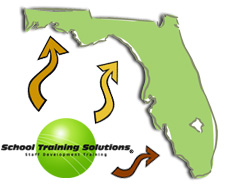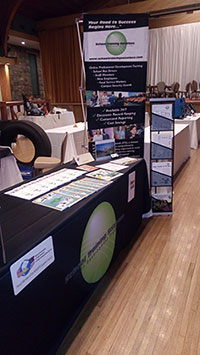
Childhood Anger Management: 5 Effective Strategies
by: Brooke Neal
Anger is a normal emotional response caused by injury, injustice, conflict, or hurt, and is felt because some sort of wrong has occurred. Anger management does not try to eliminate anger in children. Instead, it helps children learn how to identify emotional and physiological cues that will stop them from responding inappropriately to situations that make them angry. The following strategies can help teach children how to understand and manage their feelings in an appropriate way.
1. Model Proper Responses to Anger
 Children learn how to react to anger by copying the behavior of angry people around them. For example, children who hear adults around them yell and scream will also yell and scream when they become angry. They do not realize that they are not dealing with their anger appropriately because they see yelling and screaming as a normal response. Teachers and caregivers should model responsible anger management by acknowledging, accepting, and taking responsibility for their own angry feelings and by expressing anger in direct and nonaggressive ways.
Children learn how to react to anger by copying the behavior of angry people around them. For example, children who hear adults around them yell and scream will also yell and scream when they become angry. They do not realize that they are not dealing with their anger appropriately because they see yelling and screaming as a normal response. Teachers and caregivers should model responsible anger management by acknowledging, accepting, and taking responsibility for their own angry feelings and by expressing anger in direct and nonaggressive ways.
2. Create a Safe Emotional Climate
Parents, teachers and caregivers need to provide a safe emotional climate for children. Children should be encouraged to acknowledge all feelings, pleasant and unpleasant. Caregivers need to explain to children that it is okay to be angry as long as their anger is expressed appropriately. Children need to know that it is not appropriate to hurt people or animals, nor should they break things. All children should be treated fairly and be subject to the same rules. Children need to feel safe, secure, and loved.
3. Encourage Children to Label Feelings of Anger
Teachers and parents can help young children learn how to label angry feelings. Creating feeling-word posters can help them use a word to describe their feelings. Brainstorm with children and make a list of feeling words on a poster in the room. When children get angry they can refer to the chart and find words that help them verbalize their feelings. Anger Thermometers can also help children learn how to label angry feelings. When children are angry they can be given a paper thermometer to color in that shows how upset they are. The higher up the thermometer is colored, the angrier they are. Children can then discuss what made them angry and how to handle that anger.
4. Teach Proper Calming Techniques
Children can be taught to recognize the harmful physical responses of anger and ways to alleviate them by doing relaxation activities. Squeezing play dough or a stress ball, running around outside, listening to music, or painting pictures can all help to relieve physical stress. Self-calming techniques such as taking slow, deep breaths and massaging their own necks and arms can also be useful. Another useful anger management technique is the use of calm-down posters. These posters are placed on the wall and list appropriate replacement behaviors to use when children are angry, such as walk away, run around in a circle, talk to a friend, or hit a pillow.
5. Use Books, Stories, and Songs
Parents, teachers, and caregivers can use books, stories, and songs to teach children proper anger management techniques, as well as to help validate and understand their angry feelings. Besides reading books with proper anger management solutions, adults can also tell stories about children in angry situations and ask the children to contribute possible endings that show healthy resolutions to the angry situations. Inappropriate solutions to the conflict and why they are inappropriate can also be discussed. Personal stories of how adults overcame their own anger and what appropriate actions they use to calm themselves down can also be helpful.
Discounted Course:
CHILDHOOD ANGER AND ANGER MANAGEMENT
 This course defines anger, discusses its purpose, and identifies components of childhood anger. It also describes causes of childhood anger, discusses ways children respond, and addresses the adverse effects anger can have on children. In addition, the course identifies elements of an effective anger management program and provides effective anger management techniques and activities to use with children.
This course defines anger, discusses its purpose, and identifies components of childhood anger. It also describes causes of childhood anger, discusses ways children respond, and addresses the adverse effects anger can have on children. In addition, the course identifies elements of an effective anger management program and provides effective anger management techniques and activities to use with children.
Regularly $15.00 / Now $10.00







 I am planning a “Florida Meet & Greet 2016 Tour” to discuss the school bus driver and staff development online training options School Training Solutions currently offers in Florida. September 14–22, I am visiting current customers and other counties interested in adding an online component to their training programs. I will gladly demonstrate courses, answer questions about the benefits of online training, or simply leave my contact information.
I am planning a “Florida Meet & Greet 2016 Tour” to discuss the school bus driver and staff development online training options School Training Solutions currently offers in Florida. September 14–22, I am visiting current customers and other counties interested in adding an online component to their training programs. I will gladly demonstrate courses, answer questions about the benefits of online training, or simply leave my contact information.
 Children learn how to react to anger by copying the behavior of angry people around them. For example, children who hear adults around them yell and scream will also yell and scream when they become angry. They do not realize that they are not dealing with their anger appropriately because they see yelling and screaming as a normal response. Teachers and caregivers should model responsible
Children learn how to react to anger by copying the behavior of angry people around them. For example, children who hear adults around them yell and scream will also yell and scream when they become angry. They do not realize that they are not dealing with their anger appropriately because they see yelling and screaming as a normal response. Teachers and caregivers should model responsible  This course defines anger, discusses its purpose, and identifies components of childhood anger. It also describes causes of childhood anger, discusses ways children respond, and addresses the adverse effects anger can have on children. In addition, the course identifies elements of an effective anger management program and provides effective anger management techniques and activities to use with children.
This course defines anger, discusses its purpose, and identifies components of childhood anger. It also describes causes of childhood anger, discusses ways children respond, and addresses the adverse effects anger can have on children. In addition, the course identifies elements of an effective anger management program and provides effective anger management techniques and activities to use with children.


